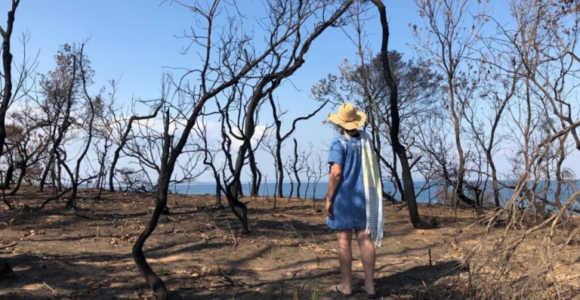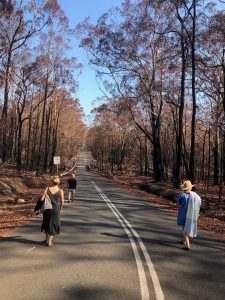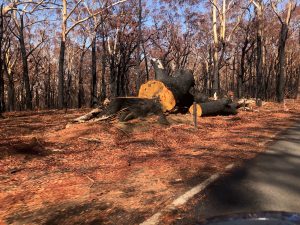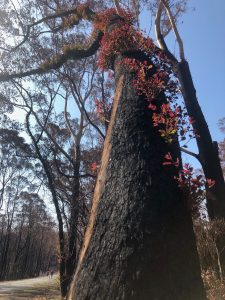Returning to the hamlet of Bendalong on the NSW south coast last weekend, only one month after fire ripped through the region, was devastating. The 13km deathly quiet drive through the Conjola National Park from the Princes Highway was like driving through a climate change Armageddon.

Virtually everything is gone. The charred landscape is spiked with burnt matchstick trees and the once lush green undergrowth is nothing more than ash. It’s unnerving to be able to see right through the Australian bush. It doesn’t make sense. All along the way were the blackened bodies of ancient and once towering gums, cut down after the fire to prevent them crashing across the road.
Everyone we met had stories to tell. Friends who had died, been badly burnt or lost homes. A season’s lost income and the staff they had to let go. But everyone was glad we were visiting the area, spending money to soften the financial blow and showing our faces so they knew they hadn’t been forgotten.
Climate advocacy groups also need our support
In the aftermath of Australia’s worst bushfire season on record, donations have rightfully poured in from all around the world to help communities get back on their feet and rescue what’s left of our devastated wildlife.
But despite the climate change horrors, public sympathy has not yet extended to our dedicated climate advocacy groups.
For decades, these groups have been doing the heavy lifting on action against climate change. For decades, these groups have lobbied the politicians, banks and fossil fuel companies, promoting the benefits of keeping coal in the ground and transitioning to a renewable future.
And apart from a small number of high profile names such as the Australian Conservation Foundation, Greenpeace and GetUp, the climate movement is made up of predominantly small groups that are hardly considered household names.
These include 350.org Australia, Market Forces, Australian Youth Climate Coalition, SEED and Australasian Centre for Corporate Responsibility, to name just a few.
We’ve been lucky that committed individuals, philanthropists and progressive companies are in position to fund our work.



But it’s time climate advocacy groups consider themselves to be as mainstream as other charities so that the wider Australian public also supports us, recognises our value and donates accordingly.
For most Australians, and especially for fire affected individuals and communities, 2020 will be the year the realities of climate change are driven home after a summer from hell. And hopefully 2020 will also be the year we all get behind the essential work of our invaluable climate advocacy groups.
Richard Green
Chair
350.org Australia
